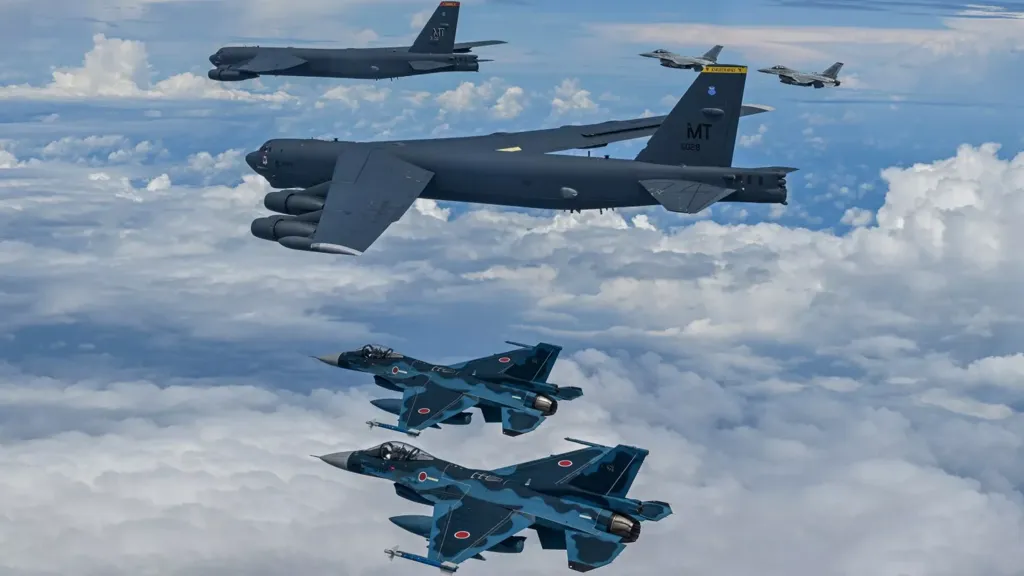North Korea has accused the United States of threatening regional peace by deploying strategic bombers for a trilateral exercise over the Korean Peninsula last week.
The drill -- which involved aircraft from the U.S., Japan and South Korea -- showed collective ability to respond immediately to regional security challenges, according to the U.S. military.
Why It Matters
North Korea is one of nine nuclear-armed nations, with an estimated 50 warheads and long-range missiles capable of delivering nuclear strikes against the U.S. mainland. Kim Jong Un, the country's leader, has vowed to pursue the "unlimited expansion" of his nuclear arsenal.
Facing North Korea's growing threats, Japan and South Korea are under the protection of U.S. extended deterrence -- also known as the nuclear umbrella -- which refers to the pledge to deter and respond to nuclear threats, including through the use of U.S. nuclear weapons.
What To Know
A pair of American B-52H bombers was escorted by two Japanese F-2 fighter aircraft and two South Korean KF-16 fighter jets during a trilateral flight on Friday, according to the U.S. Indo-Pacific Command. It was the third such flight between the allies this year.
The B-52H bomber is capable of carrying up to 70,000 pounds of ordnance, such as bombs and missiles, the U.S. Air Force says. According to the Federation of American Scientists, 46 of the 76 B-52H bombers are nuclear-capable, while the rest are conventionally armed only.
It was not immediately clear whether the U.S. bombers that participated in the allied drill were nuclear-capable. Each nuclear-armed B-52H aircraft can carry up to 20 AGM-86B air-launched cruise missiles for nuclear strikes, the Federation of American Scientists added.
According to the Japanese and South Korean defense ministries, the flight was conducted over the East China Sea, west of Japan's Kyushu Island and off the coast of South Korea's Jeju Island. Officially released photos show six allied military aircraft flying in formation.
In a statement released on Sunday, the chief of the Policy Office of North Korea's Defense Ministry claimed that joint military activities between the U.S. and its two allies are the "main danger factors" heightening the level of military tension on the Korean Peninsula.
"It is our just sovereign right to take countermeasures against provocative military actions such as the moves to strengthen the multilateral military alliance threatening the security of the region and the joint military drills with clear aggressive character," the statement warned.
North Korea's Defense Ministry also said that the country's armed forces remain in "constant military preparedness" to counter what it called "collective provocations" by the U.S. and its allies, deter their aggression, and respond to "acts of war."
What People Are Saying
The U.S. Indo-Pacific Command said in a press release on Friday: "Our steadfast commitment fosters trust, strengthens cooperation, and reinforces the collective will and ability to maintain security and stability in the Indo-Pacific."
Japan's Joint Staff Office said in a press release on Saturday: "This exercise strongly promotes trilateral cooperation to respond to regional security challenges amid an increasingly severe security environment surrounding Japan, and demonstrates the strong commitment of the three countries to secure a free and open international order based on the rule of law."
South Korea's Defense Ministry said in a press release on Friday: "Based on close coordination, the three countries will cooperate to jointly deter and respond to North Korea's threats while continuing with three-way training."
The chief of the Policy Office of North Korea's Defense Ministry said in a statement in English on Sunday: "We express serious concern over [U.S., Japanese and South Korean] hostile acts of persistently conducting provocative and threatening military actions while deliberately ignoring the security concern of [North Korea] and strongly warn of the grave consequences to be entailed by them on the regional situation."
What Happens Next
It remains to be seen whether North Korea will take further action, such as firing ballistic missiles toward waters near Japan and South Korea, thereby showcasing its military capabilities.
